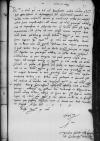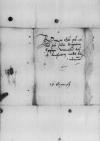 BCz, 1597, p. 791
BCz, 1597, p. 791
Reverendissime in Christo Pater et Domine, domine benefactor, modis omnibus colendissime.
Post officiosissimam et constantissimam sui commendationem.
Parabam me multis modis avisandam Reverendissimam Paternitatem Vestram, nisi pestis, quae nobiscum in dies saevit, impedivisset, nam venire ad tantum principem aulamque eius ex imperfecto et suspecto loco non hominis factum, sed bestiae reputaretur. Cum solus ob eam causam venire nequivi, has litteras scribo praesentibusque inviso salutem Reverendissimae Paternitatis Vestrae, quas secure legere potest Reverendissima Paternitas Vestra, nam auxiliante Domino Deo in domo mea nil periculi habetur.
Oro enixis precibus, si quid habet Reverendissima Paternitas Vestra ex aula serenissimi Sigismund I Jagiellon (Zygmunt I) (*1467 – †1548), King of Poland and Grand Duke of Lithuania (1506-1548); Duke of Głogów (Glogau) (1499-1506), Duke of Opava (1501-1506), Governor of Silesia (1504-1506); son of King Kazimierz IV Jagiellon and Elisabeth of Austria⌊principis et regisSigismund I Jagiellon (Zygmunt I) (*1467 – †1548), King of Poland and Grand Duke of Lithuania (1506-1548); Duke of Głogów (Glogau) (1499-1506), Duke of Opava (1501-1506), Governor of Silesia (1504-1506); son of King Kazimierz IV Jagiellon and Elisabeth of Austria⌋ nostra, dignetur me participem reddere. Et quando diaeta nobiscum celebrabitur, et quo tempore vel quis exitus eiusdem, scire cupio, nam accepto responso a Reverendissima Paternitate Vestra vado ad Kulm Land (terra Culmensis, Ziemia Chełmińska), region historical region in central-northern Poland; part of Royal Prussia⌊terram CulmensemKulm Land (terra Culmensis, Ziemia Chełmińska), region historical region in central-northern Poland; part of Royal Prussia⌋ et postea ad praeposituram, quam habeo in Poland (Kingdom of Poland, Polonia)⌊regnoPoland (Kingdom of Poland, Polonia)⌋.
Nobiscum Frauenburg (Frombork, Varmia, Warmia), town in Ermland, on the Vistula Lagoon, Ermland bishopric see⌊WarmiaeFrauenburg (Frombork, Varmia, Warmia), town in Ermland, on the Vistula Lagoon, Ermland bishopric see⌋ et in ecclesia Reverendissimae Paternitatis Vestrae omnia recte procedunt et nil me magis detinuit in tam periculoso loco, nisi ecclesia ipsa. Transactis diebus 14 habui mecum podagram et calculum, sed Domino volente iam convalui, ubi unguentum Reverendissimae Paternitatis Vestrae multum mihi profuit diemque sacratissimum Assumptionis [Domin]ae nostrae on the margin⌈Domin hidden by binding⌈[Domin]Domin hidden by binding⌉ae nostrae[Domin]ae nostrae on the margin⌉ officiumque eius in ecclesia peregi. Redierunt ex Gedano domini Leonard Niederhoff (*ca. 1485 – †1545), doctor of both canon and civil law, friend of Nicolaus Copernicus and executor of his will; studied in Cracow, Leipzig and Rome, where he obtained a doctoral degree; from 1511 parish priest of St. Bartholomew's Church in Gdańsk (Danzig); from 1515 Canon of Ermland (Warmia), and from 1519 Canon of Dorpat; from 1532 Dean of the Ermland Chapter; he also had a canonry in Kulm from which he resigned in 1533. In 1530, after Dantiscus' resignation, became a parish priest of the Blessed Virgin Mary Church in Gdańsk (KOPICZKO 2, p. 231; SBKW, p. 175)⌊NideroffLeonard Niederhoff (*ca. 1485 – †1545), doctor of both canon and civil law, friend of Nicolaus Copernicus and executor of his will; studied in Cracow, Leipzig and Rome, where he obtained a doctoral degree; from 1511 parish priest of St. Bartholomew's Church in Gdańsk (Danzig); from 1515 Canon of Ermland (Warmia), and from 1519 Canon of Dorpat; from 1532 Dean of the Ermland Chapter; he also had a canonry in Kulm from which he resigned in 1533. In 1530, after Dantiscus' resignation, became a parish priest of the Blessed Virgin Mary Church in Gdańsk (KOPICZKO 2, p. 231; SBKW, p. 175)⌋ et Alexander Sculteti (Scholtcze) (*ca. 1485 – †1570), doctor of canon law, cartographer, historian and friend of Copernicus; accused by Dantiscus and Stanisław Hozjusz (Hosius) of Sacramentarian heresy, in 1540 banished by King Sigismund I Jagiellon; in 1541 imprisoned by the Inquisition in Rome; after release from prison in 1544 he stayed in Rome for the rest of his life; 1509-1516 notary at the Roman Curia; 1519-1541 Canon of Ermland (Warmia), 1530-1539 Chancellor of the Ermland Chapter; 1536-1538 administrator of the komornictwo of Mehlsack (Melzak, today Pieniężno) (KOPICZKO 2, p. 299; SBKW, p. 219-220)⌊AlexanderAlexander Sculteti (Scholtcze) (*ca. 1485 – †1570), doctor of canon law, cartographer, historian and friend of Copernicus; accused by Dantiscus and Stanisław Hozjusz (Hosius) of Sacramentarian heresy, in 1540 banished by King Sigismund I Jagiellon; in 1541 imprisoned by the Inquisition in Rome; after release from prison in 1544 he stayed in Rome for the rest of his life; 1509-1516 notary at the Roman Curia; 1519-1541 Canon of Ermland (Warmia), 1530-1539 Chancellor of the Ermland Chapter; 1536-1538 administrator of the komornictwo of Mehlsack (Melzak, today Pieniężno) (KOPICZKO 2, p. 299; SBKW, p. 219-220)⌋, quorum nuntius nondum rediit ex curia Romana.
Cum his me commendo iterum atque iterum gratiae Reverendissimae Paternitatis Vestrae optans eandem diu et felicissime regnare pro singulari consolatione mea et domus meae.


 BCz, 1597, p. 794
BCz, 1597, p. 794